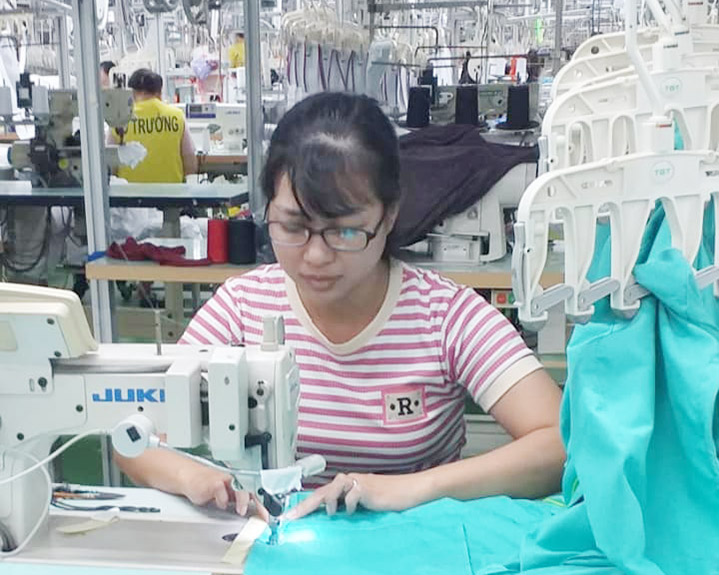Ms. Pham Thi Hien (48 years old) - a leather shoe worker in Nam Dinh said that her income depends entirely on the basic salary.
However, after working for more than 6 years, Ms. Hien's basic salary has only increased by the number of new employees in the city, because the regional minimum wage is quite low.
"My nephew worked in the city when he first started his basic salary of 4.8 million VND while I had to work for 6 years to get this salary. The new employees of my company have a basic salary of a few hundred thousand dong or more than the regional minimum wage, about 4.2 million dong/month" - Ms. Hien said.
According to the female worker, low basic salary greatly affects income and pension benefits later. The company also rarely increases the basic salary, so the female worker always looks forward to adjusting the area as soon as possible.
"In the countryside, the prices of prices are not inferior to the city, even more expensive items. On the other hand, I should adjust the area after merging the communes so that workers in the countryside have a higher salary increase than next time" - Ms. Hien expressed.
According to Ms. Hien, if the area is adjusted, her basic salary can increase to over 5 million VND due to her seniority in work. After a quick calculation, Ms. Hien estimates that her income could increase by nearly 1 million VND.
In addition, Ms. Hien shared that her work is getting more and more stressful, so she can only work for a few more years and then wait for a pension. Therefore, the female worker hopes to adjust the area early to increase the salary for social insurance contributions, and can rest assured to receive a high pension later.
Ms. Pham Thi Ly (38 years old) - a garment worker in Bac Giang said that after deciding to return to her hometown from Dong Nai to work, the most regrettable thing for her is the social insurance payment level.

"Working in Dong Nai, I was paid 5.3 million VND for social insurance by the company. When I returned to my hometown, I was only paid 4.3 million VND, 1 million VND lower, and suffered many disadvantages when receiving insurance benefits, said Ms. Ly.
According to Ms. Ly, it is necessary to amend the list of localities applying the regional minimum wage to ensure life.
Sharing more, the female worker said that adjusting the zone will narrow the basic salary gap between businesses, ensuring fair competition.
"Companies pay wages over time, have quite high basic wages and increase them regularly to attract workers. Luckily, workers like us receive salaries based on output, so our income will almost never increase if we don't try every day," said Ms. Ly.
According to Ms. Ly, working over time, each basic salary period is adjusted up, so income also increases accordingly. This is a great motivation for workers to work with peace of mind every day, not to worry too much when the prices of goods increase.
Recently, the Ministry of Home Affairs proposed to amend the list of localities applying the regional minimum wage.
The draft proposes a list of areas in regions I, II, III and IV as follows:
Region I and Region II, including: communes and wards of Hanoi City.
Region I, Region II and Region III, including: communes and wards of Ho Chi Minh City and Hai Phong City.
Region II, Region III and Region IV include: communes of the provinces of Bac Ninh, Ninh Binh, Hung Yen, Phu Tho, Lao Cai, Thai Nguyen, Thanh Hoa, Nghe An, Quang Tri, Khanh Hoa, Lam Dong, Vinh Long, Dong Thap, An Giang, Ca Mau and the cities of Hue, Da Nang, Can Tho.
Region I, Region II, Region III and Region IV, including: communes and wards of Quang Ninh, Dong Nai, Tay Ninh provinces.
Region III and Region IV, including: communes and wards of Tuyen Quang, Cao Bang, Dien Bien, Lai Chau, Son La, Lang Son, Ha Tinh, Quang Ngai, Gia Lai, Dak Lak provinces.








